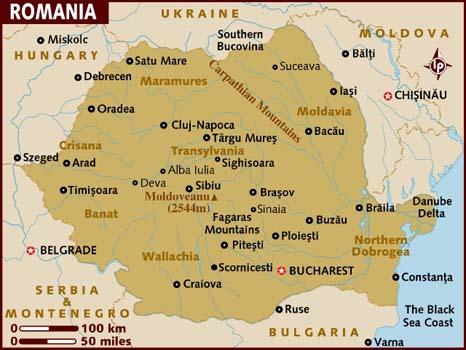Personal Safety
AUTHORITIES IN ROMANIA WILL IMPOSE A 30 DAY NATIONWIDE LOCKDOWN FROM NOVEMBER 9 IN RESPONSE TO INCREASING CORONAVIRUS DISEASE (COVID-19) ACTIVITY IN THE COUNTRY. A 2300-0500 CURFEW WILL BE IN EFFECT; TRAVEL DURING THE CURFEW WILL ONLY BE PERMITTED TO SEEK EMERGENCY MEDICAL ATTENTION, CARE FOR DEPENDENTS, OR TRAVEL FOR ESSENTIAL WORK. FACEMASKS ARE MANDATORY IN ENCLOSED PUBLIC SPACES AND CROWDED OUTDOOR SPACE NATIONWIDE. AUTHORITIES REGULARLY UPDATE THE COUNTRY'S INTERNATIONAL TRAVEL RESTRICTIONS. TRAVELERS FROM SEVERAL COUNTRIES ARE REQUIRED TO SELF ISOLATE FOR 14 DAYS ON ARRIVAL INCLUDE ANDORRA, BELGIUM, CZECH REPUBLIC, FRANCE GIBRALTAR, ICELAND, MALTA, MOLDOVA, MONTENEGRO, NETHERLANDS, SLOVAKIA, SPAIN, AND THE UK. TRAVELERS ARRIVING FROM OTHER EUROPEAN ECONOMIC AREA (EEA) COUNTRIES, AUSTRALIA, CANADA, JAPAN, NEW ZEALAND, RWANDA, SOUTH KOREA, SWITZERLAND, THAILAND, TUNISIA, AND URUGUAY MAY ENTER WITHOUT RESTRICTIONS. MOST ARRIVALS FROM OTHER DESTINATIONS REMAIN PROHIBITED FROM ENTRY WITH SOME EXCEPTIONS, SUCH AS ROMANIAN CITIZENS OR RESIDENTS AND THEIR IMMEDIATE FAMILIES, INDIVIDUALS TRAVELING FOR ESSENTIAL WORK OR STUDY, INDIVIDUALS IN TRANSIT AND INDIVIDUALS TRAVELING FOR URGENT REASONS. ALL PERMITTED INDIVIDUALS ARRIVING FROM NONEXEMPTED COUNTRIES ARE REQUIRED TO UNDERGO 14 DAYS OF SELF ISOLATION. TRAVELERS MAY END THE SELF ISOLATION PERIOD AFTER THE 10TH DAY IF THEY TEST NEGATIVE ON A COVID-19 TEST TAKEN ON THE 8TH DAY OF QUARANTINE. PERSONS PLANNING ON STAYING LESS THAN THREE DAYS IN ROMANIA WILL NOT BE REQUIRED TO SELF ISOLATE IF, UPON ENTRY, THEY CAN PROVIDE PROOF OF HAVING TESTED NEGATIVE FOR COVID-19 NO MORE THAN 48 HOURS BEFORE ARIVAL. AUTHORITIES COULD REIMPOSE, EXTEND, FURTHER EASE, OR OTHERWISE AMEND ANY RESTRICTIONS WITH LITTLE TO NO NOTICE DEPENDING ON DISEASE ACTIVITY OVER THE COMING WEEKS.
Note: this page contains basic risk information. For more details, please contact the Risk Services Office at risk@berkeley.edu.
If you are traveling to Romania on University-related business, please sign up for the University’s travel insurance program by going here. For more information on the travel insurance program, please go here.
Because everyone’s health is unique, we suggest seeking the advice of a medical professional before traveling internationally. Members of the campus community interested in protecting their health while abroad may schedule an appointment with the University Health Services International Travel Clinic.
The geopolitical threat is moderate in Romania. Romania is semi-presidential republic in which presidential elections are held every five years and parliamentary every four years. The current administration is adequately stable; allegations of corruption have created a challenge and anti-government protests were able to force a sitting government to resign. Perceptions of corruption remains a feature Romanian politics and demonstrations occur sporadically with the capacity to turn violent, whilst they may cause problems for specific governments they are unlikely to destabilize the Romanian political system. Romania maintains good relationships with its neighbors and is unlikely to experience an international destabilizing international event.
Criminal activity is most prevalent in tourist locations around Bucharest and other large towns, as well as on public transportation.
Nonviolent crime poses a moderate threat to foreign nationals and is concentrated in heavily populated tourist areas like shopping and entertainment areas. Thieves typically target luggage, wallets, purses, and smartphones. These opportunistic crimes can occur anywhere, but especially at major tourist attractions and on public transportation, particularly in densely populated areas. Criminals typically target foreign nationals as the opportunity presents or if they display obvious signs of wealth.
Crimes against foreign nationals are more likely to escalate late at night. Criminals often act in groups.
Scams pose a moderate threat to foreign nationals in Romania. Beggars typically perpetrate this crime, which may include a variety of tactics, including groups of children who perpetrate theft. Thieves often use surprise to distract their victims; thieves may present themselves as plainclothes police.
Overall, the threat of violent crime in Romania is low; foreign nationals are rarely targeted by criminals. Violent crime, including assault, poses the greatest threat from unstable or drunk individuals late at night near nightclubs.
Gender-based violence and/or discrimination poses a low threat to foreign nationals in Romania. Anti-LGBTQ violence is systemic in Romania. The LGBTQ community in Romania does not enjoy discrimination protections, and police have been known to let attacks on LGBTQ demonstrations occur.
Organized crime does not usually affect foreign nationals in Romania. Known organized crime groups specialize in drug smuggling, human trafficking, financial crime, and counterfeiting.
Highway robbery and banditry pose a low threat in Romania. For most foreign nationals, the threat of kidnapping in Romania is generally minimal; kidnappers are more likely to target locals. The most common type of abduction in Romania is high net-worth individual kidnap-for-ransom. Victims are usually released unharmed and relatively quickly.
Legal/Political

Criminal Penalties: You are subject to local laws. If you violate local laws, even unknowingly, you may be expelled, arrested, or imprisoned. Furthermore, some laws are also prosecutable in the United States, regardless of local law.
Arrest Notification: If you are arrested or detained, ask police or prison officials to notify the U.S. Embassy immediately.
Special Circumstances:
- Romania is situated in a seismically active region and has a history of devastating earthquakes, with the greatest risk occurring in Bucharest.
- Mountainous areas of the country can be subject to torrential rains and flash floods, especially in the spring and summer months.
- Streets and sidewalks are often icy and hazardous during winter.
- Avoid contact with stray dogs.
- Travelers’ checks are of limited use, but ATMs (“bancomats” in Romanian) are widely available.
LGBT Travelers: There are no legal restrictions on same-sex sexual relations or the organization of LGBTI events in Romania. However, the annual gay pride parades in Bucharest have been the scene of violent protests in past years.


